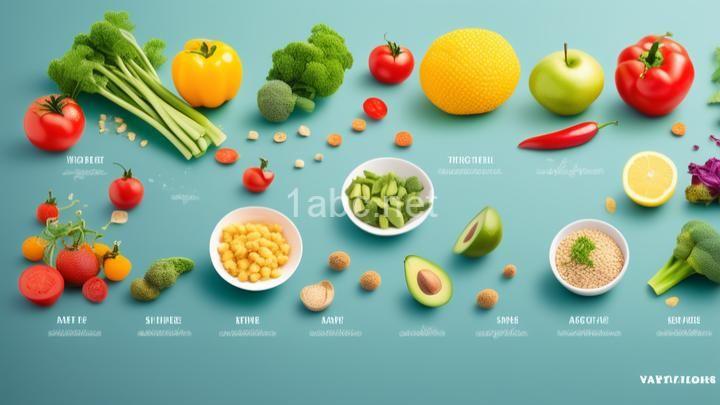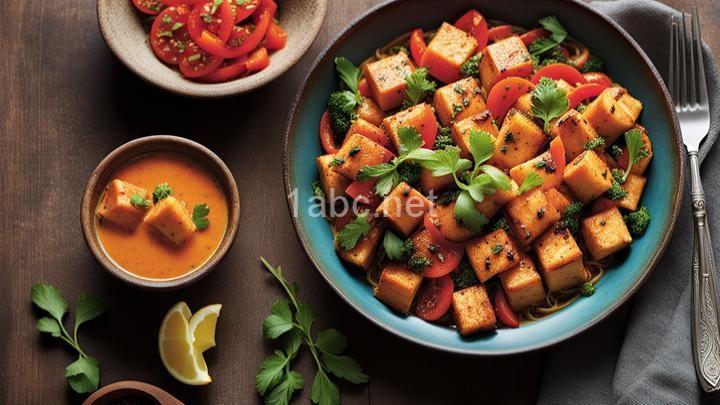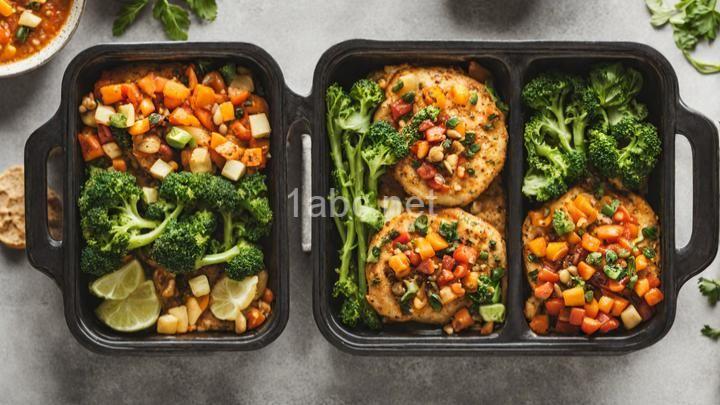The Ultimate Guide to Transitioning to a Vegetarian Diet with Meatless Mondays
Introduction:
I. Understanding the Benefits of a Vegetarian Diet:
II. Getting Started with Meatless Mondays:
III. Exploring Vegetarian Protein Sources:
IV. Navigating Nutritional Considerations:
V. Overcoming Challenges and Staying Motivated:
VI. Beyond Meatless Mondays: Embracing a Vegetarian Lifestyle:
Conclusion:

Introduction:
Welcome to our ultimate guide on transitioning to a vegetarian diet using the popular concept of Meatless Mondays. We understand that making dietary changes can be overwhelming, but with a friendly approach and the support of Meatless Mondays, you'll find it easier than ever to embrace a vegetarian lifestyle.
I. Understanding the Benefits of a Vegetarian Diet:
Making the switch to a vegetarian diet not only benefits your health but also contributes to a more sustainable and ethical world. Research has shown that vegetarians have a lower risk of obesity, heart disease, high blood pressure, and certain types of cancer. By eliminating or reducing meat consumption, you are also reducing your carbon footprint and water usage, as well as preventing animal cruelty.
Let's dive into some interesting facts! Did you know that if every American participated in Meatless Mondays, it would be equivalent to taking over 2.5 million cars off the road in terms of reducing greenhouse gas emissions? That's pretty impressive, right? And don't worry, you won't be missing out on protein either. Vegetarian diets can provide all the necessary nutrients, and studies have shown that plant-based protein sources can be just as effective as animal-based protein in building and repairing muscles.
II. Getting Started with Meatless Mondays:
Now that you understand the benefits, let's talk about how to get started with Meatless Mondays. Meatless Mondays is a simple concept: one day a week, you choose to go meat-free. It's a small step that can have a big impact, both on your health and the environment.
To plan your Meatless Mondays, start by looking for vegetarian recipes that excite you. There are countless websites, cookbooks, and even apps dedicated to providing delicious meat-free recipes. Experiment with different cuisines and flavors to keep things interesting. And don't forget to involve your family or friends in the process. Cooking and sharing meals together can be a fun and rewarding experience.
If you're not sure where to begin, here are a few recipe suggestions to get you started:
- Lentil and vegetable curry: This flavorful dish is packed with protein and will satisfy your taste buds.
- Portobello mushroom burgers: Grilled mushrooms make a delicious and hearty alternative to a traditional burger.
- Chickpea and vegetable stir-fry: Quick, easy, and packed with nutrients, this stir-fry is perfect for busy weeknights.
III. Exploring Vegetarian Protein Sources:
One of the biggest concerns when transitioning to a vegetarian diet is ensuring an adequate intake of protein. Rest assured, there are plenty of plant-based protein sources that can meet your needs. Legumes like lentils, chickpeas, and black beans are not only rich in protein but also high in fiber and other essential nutrients.
If you're looking for meat alternatives, tofu, tempeh, and seitan are excellent options. They can be seasoned and prepared in various ways to mimic the texture and taste of meat. Quinoa, a complete protein grain, is another great addition to your vegetarian pantry.
To give you a taste of what's possible, here's a protein-packed recipe for Meatless Mondays:
- Quinoa and black bean salad: Combine cooked quinoa, black beans, diced bell peppers, cherry tomatoes, and a zesty lime dressing. This refreshing salad is not only delicious but also a great source of protein and fiber.
IV. Navigating Nutritional Considerations:
While a vegetarian diet can provide all the necessary nutrients, there are a few key nutrients that require extra attention. Iron and vitamin B12 are often a concern for vegetarians. Iron can be found in plant-based sources such as spinach, lentils, and tofu, but it is important to pair these iron-rich foods with vitamin C sources like citrus fruits to enhance absorption.
Vitamin B12, on the other hand, is mainly found in animal products. As a vegetarian, you can obtain vitamin B12 from fortified foods like breakfast cereals, plant-based milk, and nutritional yeast. If you're concerned about meeting your vitamin B12 needs, a supplement might be a good option. Always consult with a healthcare professional to determine the right dosage for you.
When planning your meals, aim for a variety of fruits, vegetables, whole grains, legumes, nuts, and seeds. This will ensure that you're getting a wide range of essential nutrients. Don't forget to enjoy the process and experiment with new ingredients and flavors.
V. Overcoming Challenges and Staying Motivated:
Transitioning to a vegetarian diet may present some challenges, especially in social situations or when dining out. However, with a positive mindset and a little preparation, you can overcome these obstacles.
When dining out, do some research beforehand to find vegetarian-friendly restaurants or menu options. Many establishments now offer vegetarian or vegan alternatives. If you're attending a social gathering, offer to bring a vegetarian dish to share with others. This way, you can introduce your friends and family to the delicious world of plant-based cuisine.
To stay motivated, it can be helpful to join supportive communities or online forums where you can connect with like-minded individuals. Share your experiences, ask questions, and seek inspiration from others who have successfully embraced Meatless Mondays and a vegetarian lifestyle. Remember, you're not alone on this journey.
VI. Beyond Meatless Mondays: Embracing a Vegetarian Lifestyle:
Once you've mastered Meatless Mondays, you might find yourself wanting to explore more plant-based options throughout the week. Fortunately, there are endless possibilities when it comes to vegetarian cooking. You can experiment with different cuisines, flavors, and cooking techniques.
To expand your meat-free repertoire, consider investing in a vegetarian cookbook or subscribing to a vegetarian food magazine. These resources can provide you with a wealth of ideas and recipes to keep your meals exciting and satisfying.
As you continue on your vegetarian journey, you'll start reaping the long-term benefits of a plant-based lifestyle. Not only will you feel healthier and more energized, but you'll also be contributing to a more sustainable and compassionate world. Remember, every small step counts, and by participating in Meatless Mondays, you're part of a growing movement towards healthier and more environmentally friendly eating habits.
Conclusion:
In conclusion, transitioning to a vegetarian diet with the help of Meatless Mondays is a fantastic way to improve your health, reduce your environmental impact, and promote animal welfare. By understanding the benefits of a vegetarian diet, getting started with Meatless Mondays, exploring vegetarian protein sources, navigating nutritional considerations, and overcoming challenges, you'll be well on your way to embracing a vegetarian lifestyle.
Remember, this journey is about progress, not perfection. Celebrate your achievements, no matter how small, and don't be too hard on yourself if you slip up occasionally. It's all part of the learning process.
We hope this ultimate guide has provided you with the knowledge and inspiration you need to embark on your vegetarian journey confidently. We'd love to hear from you in the comments section below. Share your experiences, ask questions, and let us know how Meatless Mondays have impacted your life. Together, we can make a difference, one meat-free meal at a time.
FREQUENTLY ASKED QUESTIONS
What is The Ultimate Guide to Transitioning to a Vegetarian Diet with Meatless Mondays?
The Ultimate Guide to Transitioning to a Vegetarian Diet with Meatless Mondays is a comprehensive resource that can help you make a smooth transition towards adopting a vegetarian lifestyle. It encompasses the concept of Meatless Mondays, which is a popular movement encouraging people to go meat-free for one day each week.This guide provides you with valuable information on the benefits of a vegetarian diet, as well as practical tips and strategies to incorporate Meatless Mondays into your routine. Whether you are considering a vegetarian diet for health reasons, environmental concerns, or ethical considerations, this guide has got you covered.
By gradually reducing your meat consumption and replacing it with delicious vegetarian alternatives, you can experience improved health, reduced environmental impact, and the satisfaction of making a positive change. The guide offers a variety of recipes, meal plans, and shopping tips to support you on your journey.
Transitioning to a vegetarian diet can sometimes feel overwhelming, but with the help of this ultimate guide, you'll have all the tools and knowledge you need to make a successful transition. So, why not give Meatless Mondays a try and embark on a journey towards a healthier and more sustainable lifestyle?
Why should I consider transitioning to a vegetarian diet?
Transitioning to a vegetarian diet can offer several benefits for your health, the environment, and animal welfare. Here are a few reasons why you should consider making the switch:
-
Improved Health: A well-planned vegetarian diet can provide all the necessary nutrients your body needs. It can be rich in fruits, vegetables, whole grains, legumes, and plant-based proteins, which can help reduce the risk of chronic diseases like heart disease, high blood pressure, and certain types of cancer. Additionally, a vegetarian diet is often lower in saturated fat and cholesterol, which can have a positive impact on your overall health.
-
Environmental Sustainability: Animal agriculture is a major contributor to greenhouse gas emissions, deforestation, and water pollution. By adopting a vegetarian diet, you can significantly reduce your carbon footprint and help combat climate change. Plant-based diets require fewer resources, such as land, water, and energy, making them more environmentally sustainable.
-
Ethical Treatment of Animals: Many people choose a vegetarian diet to align with their values regarding animal welfare. The meat industry often involves practices that can be cruel and inhumane to animals. By choosing not to consume animal products, you can contribute to reducing the demand for factory farming and support more compassionate and ethical treatment of animals.
-
Variety and Creativity in Cooking: Transitioning to a vegetarian diet can open up a whole new world of flavors and culinary experiences. It encourages you to explore a wider range of fruits, vegetables, grains, and spices, leading to more diverse and exciting meals. From hearty salads to flavorful stir-fries, vegetarian cuisine offers endless possibilities to satisfy your taste buds.
-
Community and Support: Joining the vegetarian community can provide you with a sense of belonging and support. You can connect with like-minded individuals, share recipes, and exchange tips on navigating the vegetarian lifestyle. Online forums, social media groups, and local vegetarian organizations can be excellent resources for guidance and inspiration.
Remember, transitioning to a vegetarian diet is a personal choice, and it's important to do it in a way that suits your individual needs and preferences. Consulting with a healthcare professional or a registered dietitian can help ensure you're meeting your nutritional requirements while making the switch.
What is the concept of Meatless Mondays?
Meatless Mondays is a concept that encourages people to go without meat on Mondays. It is a global movement aimed at promoting healthier and more sustainable eating habits. The idea is to start the week off on a plant-based note by choosing vegetarian or vegan options for meals and snacks. By reducing meat consumption, individuals can potentially improve their health, reduce their carbon footprint, and contribute to animal welfare. Meatless Mondays is a simple and accessible way for people to make a positive impact on their health and the environment.
Can I still get enough nutrients on a vegetarian diet?
Absolutely! A vegetarian diet can provide you with all the necessary nutrients your body needs. While it may require a bit of extra planning and attention to specific food choices, it is definitely possible to get enough nutrients on a vegetarian diet.One important consideration is ensuring you are getting enough protein, as this is often associated with meat consumption. However, there are plenty of plant-based protein sources available, such as legumes (like beans, lentils, and chickpeas), tofu, tempeh, seitan, and quinoa. Incorporating a variety of these protein-rich foods into your meals can help you meet your protein needs.
In addition to protein, it's important to focus on getting a good balance of other essential nutrients. For example, iron can be obtained from sources like spinach, kale, lentils, and fortified cereals. Calcium can be found in foods like milk alternatives (such as soy or almond milk), tofu, leafy greens, and fortified plant-based milks.
Omega-3 fatty acids, which are typically associated with fish, can be obtained from plant-based sources like chia seeds, flaxseeds, walnuts, and algae-based supplements. Vitamin B12, which is primarily found in animal products, may require supplementation or the use of fortified foods, such as plant-based milks or breakfast cereals.
By incorporating a diverse range of fruits, vegetables, whole grains, legumes, nuts, and seeds into your vegetarian diet, you can ensure you are getting a wide array of essential vitamins, minerals, and other nutrients. It's also a good idea to consult with a registered dietitian or nutritionist who can provide personalized guidance and help you create a balanced vegetarian meal plan.
Remember, everyone's nutritional needs are different, and it's important to listen to your body and make adjustments as needed. With proper planning and attention, you can absolutely meet your nutrient requirements on a vegetarian diet.



